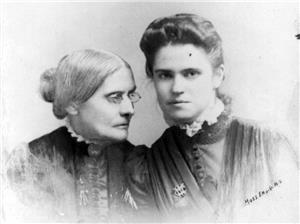On July 1, 1909, the National American Woman Suffrage Association holds its first public evening meeting at Plymouth Congregational Church in Seattle. The evening is a great success, establishing a pattern that will continue throughout the weeklong convention and offering prominent national suffrage proponents a chance to build support for Washington state's upcoming vote on woman suffrage. The convention is taking place during Washington's first world's fair, the Alaska-Yukon-Pacific (A-Y-P) Exposition, held on the University of Washington campus. The confluence of the widely publicized convention and the world's fair will help win supporters for women's right to vote.
Filled to Overflowing
The Seattle Post-Intelligencer described the sanctuary chapel as "filled to overflowing" ("Suffragists Locked...").
National American Woman Suffrage Association vice-president Rachel Foster Avery (1858-1919) presided. Protestant Methodist Church minister Dr. A. Norman Ward delivered the invocation, and soprano Grace Goodner sang a solo. Seattle Mayor John F. Miller welcomed the visiting suffragists on the city's behalf.
Justice, Right, and Truth
In 1901 suffrage matriarch Susan B. Anthony (1820-1906) had described Rachel Foster Avery as "not only one of the most loveable, but also one of the most capable and level-headed young women we have in our ranks today, and all her words and actions are based on justice, right and truth" (The Life And Work ..., p. 1237).
A lifelong suffragist, Rachel Foster Avery had begun writing suffrage articles for national newspapers at the age of 17 and was deeply involved with planning suffrage campaigns nationally and internationally as an aid to Anthony when she traveled abroad. The Part Taken By Women In American History described suffrage matriarch Elizabeth Cady Stanton (1815-1902) as Rachel Foster Avery's mother's "Sunday school teacher and lifelong friend" (p. 586).
The Ballot In The Hands Of Women
The Seattle Post-Intelligencer quoted Mayor Miller's welcoming remarks:
"In this state the women have all the rights of men with the exception of the ballot and the right to hold public office. If the ballot in the hands of the women would tend to eliminate corruption in politics and stand for honesty in public office, I would stand strongly for woman suffrage" ("Suffragists Locked ...").
Fanny Garrison Villard (1844-1928), widow of railroad tycoon Henry Villard and daughter of abolitionist William Lloyd Garrison, who was herself a lifelong reformer, responded on the organization's behalf. The Seattle Post-Intelligencer described Villard, somewhat quizzically, as "that type of woman who is always surrounded by friends, who worship her inherent sweetness and the charm that continues even when the woman has reached the advanced age of Mrs. Villard" ("Suffragists Locked...").
Three Cheers For Miss Shaw
The Seattle Post-Intelligencer went on to state that Harriet Taylor Upton, NAWSA treasurer, "delivered herself of some humorous anecdotes" ("Suffragists Locked ..."). Upton's humorous sales pitch before passing the offering plate was a regular feature of the convention's evening sessions. After the money was collected, Rachel Foster Avery introduced NAWSA president Anna Howard Shaw.
The Seattle Post-Intelligencer continued: "As this little gray-haired woman stepped into place in front of the platform the church rang out with a storm of applause that gave hearty evidence of what that audience thought of this great suffragist who is now heading the great movement in this country. Miss Shaw spoke long and eloquently on the cause to which she has devoted her life and money" ("Suffragists Locked ...")
When Shaw's rousing speech was over three teenaged suffragists, Gertrude, Helen, and Louise Kangley, led the assembly in three rousing cheers. The Seattle Post-Intelligencer article concluded, "The compliance with this proposal was loud."

